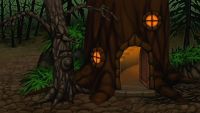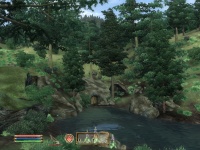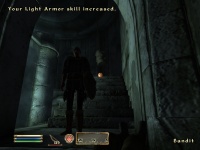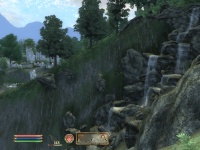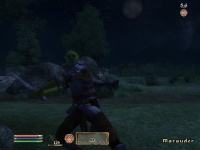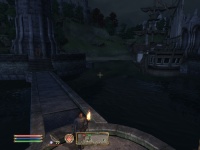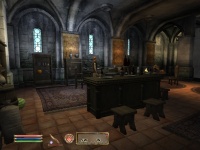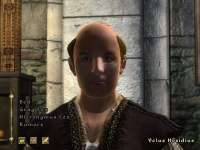|
|
|
Main News Forums Games Games Database Top 100 Release List Support Files Features Reviews Previews Interviews Editorials Diaries Misc Download Gallery Music Screenshots Videos Miscellaneous Staff Members Privacy Statement |
Elder Scrolls 4: Oblivion - A Review
You have seen a lot of reviews out there for Oblivion, and probably read most of them. You, like me, will have had the impression that some were rushed, some thoroughly researched. The verdicts on the game are between a 4/5 at Gamespy (the lowest I have seen as I write this article) and 10/10 on various other sites. Consensus seems to be that the game is an excellent one, with an average rating of 92-93%. So - what is left for me to tell you? A lot. Most regular readers will know me as an Elder Scrolls fan of the first order. I loved Morrowind and I am still playing it today with a lot of mods added. I loved Daggerfall and have high respect for what the game offered at that time. I followed the development of Oblivion from the very beginning, and I was looking forward to this game like no other. My expectations were high - I've had them met and surpassed in many ways, and I have been disappointed with other aspects of the game at the same time. Fact is, that Oblivion is an incredible, satisfying experience for me; fact is furthermore that I would certainly rate this game highly myself if I hadn't decided to NOT do a numerical rating at the end of the review. Yet beyond all the amazing things in Oblivion there are others that are bad - design decisions taken by Bethesda that might have been taken with good intentions but backfired. I consider the game rather unenjoyable for me the way Bethesda shipped it. This is said from the perspective of someone who is an old school role player and has good knowledge of the The Elder Scrolls (TES) lore. It's of course not unplayable in a technical way - it's just that… it doesn't feel right. So: On the one hand, I think this is an outstanding game, and on the other hand I think it fails to deliver? Am I nuts? No. Let me explain. What you get when you buy Oblivion is a highly detailed, rich and colourful world. It's without question the most living, vibrant and interesting game world we have seen so far. Yes, Daggerfall was larger, but the largeness was emptiness most of the time. Yes, Morrowind was more exotic, but less elaborate and alive. Oblivion is pure fun to explore - even to watch - and while the variety of flora and fauna is limited, the fact is we are talking about a single province of Cyrodiil with not too many extremes in climate. Every step you take opens a new vista, and new "wow"-moment for you. This didn't wear off even after the 70+ hours I have spent in the game for this article. You also get a decent, while not surprising or mind-blowing main quest (that you can leave behind as you wish), and you get side quests that range from "yuk" (encountered only one that was really boring so far and fell into that category) to very good and entertaining (like the paranoid guy in Skingard), in some cases even brilliant. They are way better than in Morrowind, and some of them let you end them in different ways, with consequences to the game world (one for example, will prevent you from joining the mages guild - well, nearly, if you don't fix what you have done). The next thing you get is the most impressive AI in a CRPG by now. Don't expect wonders from the Radiant AI, but expect it to act more lifelike than what you have seen before. People have schedules, needs, and a certain freedom in how they accomplish their goals. More than 1000 NPCs lead their lives, travel from town to town, safeguard main routes, pay visits to the inn, eat, drink, sleep, and react to you in various ways. You will discover that the voice acting is quite good as well (with a few glitches in the conversations and some repetitive talking between NPCs), and overall the NPCs help you to be immersed in this game. You get interesting dungeons with traps, larger than those in Morrowind - and though they are built from repeating blocks, they most of the time offer a surprise or two. While you were able to clean out most dungeons in Morrowind in 5 - 10 minutes, the ones in Oblivion take you at least 15, or much longer for the bigger ones. You get an excellent character creation system with more options than ever and every freedom you can dream of to put together the character face you want (but nothing can be changed about how your body looks except the color of your skin). You get an improved combat system that now feels alive, brutal, demanding and is fun. Yes, it is really fun with all the dodging, moving and blocking going on (if you have framerates above 15-20 - otherwise it is a bit hard to control). Fights do last for some time, and apart from your stats, you have to be skilled in fighting as well. Going in and whacking away leads to your death in most cases - this time it matters which opponent you are facing, and the means of attacking are very important. You get a good stealth system, which, in combination with your combat skills, plays out remarkably well. Marksman is vastly improved over Morrowind, and it's a want-to-have skill for those not liking to bash in and spill blood like a berserker. Last, but not least: You get great graphics with a system that is above the recommended specs, but the real deal is that Oblivion is extremely scaleable and you will be able to enjoy it even with a minimum system. I have two systems running Oblivion right now: an Athlon 64 3000+ with 2 GB RAM and a 7800GFX, running it perfectly with most things maxed out (the only tweak applied outside the in-game panel is having coolbits set to 0 in the driver software, since tweaks in the.ini file tend to crash my system), and on a notebook (2.4GHz, 1MB, ATI Mobile X700), where I run a basic setting with no grass, but bloom and AA at 1024x600 with excellent framerates. The graphics system has some downfalls, too, but they can be corrected by tweaks and mods. More on that later. So, to conclude this: you get an enormous stage with decent actors to play out your adventure. In this field, Oblivion sets a new standard, is king of the hill and wearer of the crown - no doubt about it. That's a lot, sure, but that's less than I would have liked to see.
While Bethesda delivered big time in the points mentioned above, they failed to deliver (at least for my playing style) game mechanics that would make this game as a whole as outstanding as the stage. What they did instead was to take one key element of every TES game and overused it: scaled levelling. TES games were always about being free to do the things you want to do. Where other RPGs offered you a narrow path you had to follow, with branches and twists if it really was a good RPG, Bethesda gave you a place to live in and to do the things that had to be done. In order to achieve this goal, they scaled the enemies to you. That means that monsters you encountered were some levels above or below you. In Morrowind, this was when cliff racers in Seyda Neen suddenly turned into netches, or when ghosts in crypts became bonewalkers. There is no other way to ensure that you can go wherever you want to go but to use scaled enemies in 98% of all cases (there are fixed level monsters in all TES games as well). But Bethesda overdid it this time. Monsters scale (in a range) with you, loot scales with you, even NPCs scale with you. To a certain amount, this also happened in Daggerfall and Morrowind, but in Oblivion, there is too much of it. This wouldn't be a problem really if Oblivion was just a 3D Diablo or if you want to play it like that. It IS a problem because it is a fine RPG and wants to be immersive. At higher levels, bandits are equipped with legendary gear, commoners wear glass weapons and monsters drop loot like they were incarnations of Bill Gates. Don't get me wrong: mechanics aren't broken. This system ensures that you will face challenges no matter which level you are, and if you come from the Diablo side of the universe, it will be familiar to you - but for someone at home in the TES universe, these things are somewhat disturbing. The world that has been designed with so much love and attention to detail becomes unbelievable when you level up enough. While I have no objection against opponents levelling with my character, I have some objections against how it is done. There are areas in the game where it becomes annoying - like in the arena, where you can become grand master of the fighters on a very low level. This makes no sense, does it? In my eyes, it's a design oversight; they could have easily done it in a way that the arena refuses to let you fight a second time if you aren't at least a level above your first fight. The big problem for me, however, is the levelled loot. At some point in the game, high quality stuff can be found everywhere. It's so common, you wonder how they all can afford this stuff. Yes, it's one way to balance the game much better than in Morrowind - but for me, it feels like it is the wrong way. The second area where the levelled loot is said to be contraproductive is thieving. While I cannot confirm that fact from my own experience (I haven't tried thieving a lot so far), but reports are that it's just not rewarding when you know that your loot is bound to your level. Another design glitch is the fact that once you are a member of a guild, you have access to everything you can find in a guild house. You can take potions, apparel, scrolls, books, you name it, even if you are only an associate. It's one of the problems that tends to ruin the immersion Bethesda has tried to make possible. The next problem I have is with the levelling system for the character. First of all, it is going way too fast for my taste. The fast levelling destroys that epic feeling you are looking for in TES games. It's also a little bit off balance compared with what there was in Morrowind, so characters concentrating on other skills than those useful in combat in one way or another will have a hard time in this game (which, on the other hand, could be seen as realistic as well - you don't persuade a troll into loving you, do you?). So, for me the mechanics of this game as it has been released, are a step back, not a step forward. I fully acknowledge the possibility that it is only a certain part of gamers that will dislike how Bethesda has handled these things in Oblivion. But for me, they are important and whilst not broken, seriously flawed. And yet I said that I have a great time playing this game and that I consider it to be the best offering for an RPG fan at the time being. Believe me or not - I am already playing the game that I wanted to play before Oblivion was released. That is because of the modding community that has already catered to different tastes with different treats (20 days after the release of Oblivion, Tessource.net already lists more than 790 Oblivion mods). Since Bethesda laid such a solid groundwork of epic scale, and due to the creativity of the modders, Oblivion has become a lot more games than just one. And it has, within two weeks after its release, become the (nearly perfect) game for me. My game.
Let me tell you about some of the mods I have installed right now. They are all simple ones, but they have big effects on the game. I know that other mods take the game in a different direction, but here is what I use: The first mod tones down levelling by the factor of 3. It takes three times as long to level than in the original game (the mod offers 2x, 3x, 4x, 8x and 10x slowdowns). Gaining levels feels right again for me. Another mod doubles the length of a day in the gameworld. This allows me to have more relaxed and less rushed game sessions. A third mod removes the ability to fast travel to a location before you have visited it, including the cities (I do not fast travel at all, but I think this is how it should have been in the original release, IMHO). Then there is a mod that makes the interface more PC-like, with more lines and smaller text, and I use it as well. A nifty little mod lets fauna disappear after you have harvested it, and it only returns after a certain amount of time. The guild item ownership has been fixed by a mod I use, and now you can only use things there for free according to your rank. It's back to the graphics now. Out of the box, the distant textures look washed out and blurred. Funny enough, this fact is much more hidden on the Xbox360, where you just don't notice it that much. Anyhow, the modding community has found a solution that - at least on my system - doesn't impact FPS at all, but turns the visual into something really next-gen: I have installed new textures for distant terrain, as well as a LOD normal map replacement (it smoothes the shadows on the distant landscape). The result is that there is little difference between what you see close to you and what you see far away, which improves the visual quality of the game enormously. I also am using a mod that makes dungeons and nights darker, and one that makes the water look even more realistic. The most important mod for me is this one: Tom Servos's Rare Items (at the time being version is 1.18). It fixes the loot problem for me completely. Rare items are now rare, really rare, and you don't find daedric armor on bandits anymore. Magical items are rarer, too, and this all is done without tampering with the levelling of creatures (as I said, I have no problem with that). These and a couple of other cosmetic mods, which do not change the game system, have turned Oblivion into the game I wanted to play. It looks good, plays good and is so much fun it's hard to describe. Going back to the vanilla Oblivion as it was shipped: Does it deserve the high ratings it has received? And again, my answer has three parts: Yes, no, and hell yes. Yes, because this game really is the next step in the series and works for most folks out there as it is. It's not a bigger game than Morrowind, it's a game of its own. Changes have been made, and it's good that Oblivion is more than a sequel. No, because I feel that they sometimes took the easy route when designing game mechanics, not the best route. And hell yes, because they once again included the construction set. So we can tune the game to our liking. Bethesda has a track record of not doing the greatest releases of all time. Look at Daggerfall, look at Morrowind (which was already less buggy than Daggerfall). In this respect, the release of Oblivion was flawed as well, although the stability of the game is, at least on my system, even better than it was back when Morrowind was released. This time, the simultaneous release for both systems (PC and Xbox 360) could have been a part of the problem as well. Oblivion, due to the interface and the controls, feels more like a console port to the PC than vice versa. Since I own both versions, I can tell you that, in my opinion, the shipped Xbox 360 version feels and plays better than the PC version. But console owners are, for the most part, stuck with what they have got, including the scaled levelling system. The console feeling has been modded out of the PC in two weeks, and as a result, Oblivion became more of an RPG than it originally was. For my taste, the PC version with the mods I applied, now feels and plays way better than the console version. And this is why I tend to thank Bethesda for the construction set, rather than to blame them for the original release. Although some design issues are nothing you could explain away as personal taste. Two final thoughts: First, some people feel that Oblivion has been dumbed down during development. That's one way to see it, and if you compare Oblivion with the complexity Daggerfall offered, a legitimate one. On the other hand, you could also phrase it positively: Oblivion has been streamlined, and in my opinion, this works out pretty well. Does it diminish my gaming experience that polearms are taken out of the game? Not really, no; nor does the fact that axe and blunt are in the same category now. Levitation is something I miss, yes, but I can live with that. Every game design has compromises and limitations, so does Oblivion's design. But for me, the package is more than convincing. And second: I still wonder why most of the reviews out there don't mention or elaborate on the obvious design roughness the release had. Some of them, like the issues with guild items, show up right in the beginning. Others should have been obvious after at least 20 hours into the game. So, my overall conclusion would be: a diamond delivered with some serious scratches and unpolished, but also with the tools to make it shine. For me, thanks to the modding community AND the game itself, this gem shines and sparkles now. And I am looking forward to the many facets upcoming mods will make visible. As I said, no final rating here. Because for me, Oblivion is the combination of the original release, the construction set and the creativity of the gamers. But I can tell you this: when the internal poll for game of the year will be held at RPGDot, Oblivion is on the top of my list because of its scope, its possibilities and its community. Might well be that once Gothic 3 is released, the game will be a worthy contender, but until then, Oblivion will eat my gaming time with ease… PS: No review of Oblivion seems to be complete without these two words, and I won't fail to write them: Patrick Stewart. :)
Average Reader Ratings: 8.55 (271 votes) |
|||||||||||
|
All original content of this site is copyrighted by RPGWatch. Copying or reproducing of any part of this site is strictly prohibited. Taking anything from this site without authorisation will be considered stealing and we'll be forced to visit you and jump on your legs until you give it back. |
||




